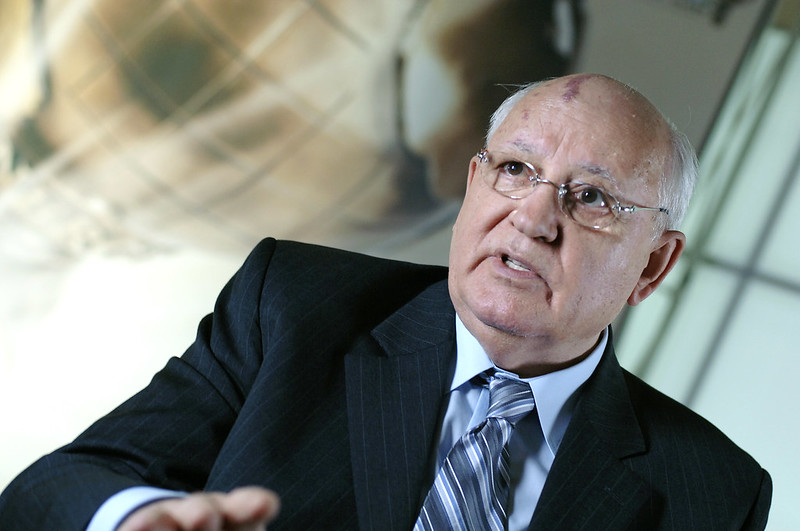News
Gorbachev remembered: Respected in the West, detested in Russia

Born in 1931, Gorbachev started his working life driving combine harvesters before ultimately becoming a lawyer. (File Photo: European Parliament/Flickr, CC BY-NC-ND 2.0)
Former Soviet president Mikhail Gorbachev is dead. Given the tributes being paid to him in the West for his efforts to end the Cold War, it might be difficult to appreciate just how unpopular he became in his native Russia.
Russians more often remember Gorbachev for the collapse of the Soviet system and ultimately the Soviet Union itself. Prominent among those Russians is current President Vladimir Putin, whose invasion of Ukraine is, in part, an attempt to ressurrect a Russian empire that was lost, to a significant extent, by Gorbachev.
Born in 1931, Gorbachev started his working life driving combine harvesters before ultimately becoming a lawyer. He then rose rapidly through the ranks of the Communist Party, and by 1980 had become the youngest full member of the Politburo — a sort of cabinet of the Communist Party.
During the early 1980s, Leonid Brezhnev was followed in rapid succession by the similarly ailing Yurii Andropov and Konstantin Chernenko as General Secretary of the Communist Party. Mikhail Gorbachev ascended to the post in March 1985.
Tried to bring about change
Gorbachev was certainly a lively and engaging political figure by the standards of his immediate predecessors.
There is no doubt his relative youth — he was 54 when he became General Secretary of the Party — was supposed to help him re-invigorate a Soviet Union beset with a number of pressing problems.
Not only was the Soviet economy stagnating, but the Soviet Union was rapidly falling behind the West in terms of technological development and bogged down in its war in Afghanistan.
At first, Gorbachev tried to bring change by engaging in the sort of tinkering with the system that had been tried by his sponsor and predecessor Andropov.
One such measure in the 1985-86 period was a campaign against alcohol consumption. It had a negative impact on government revenues through reduced alcohol sales and earned Gorbachev the nickname “Mineral’nii sekretar’” — which had the same ring to it as his official title of General’nii sekretar’ — but referred to his insistence that mineral water, rather than alcohol, be served at meetings.
The Soviet Union’s economy had been kept afloat by high oil prices, but the oil price crash of the mid-1980s was one factor driving Gorbachev towards more radical reform.
At the same time, the Chernobyl nuclear accident in April 1986 challenged the idea of “glasnost” — or openness — that Gorbachev was trying to popularize in the Soviet political lexicon.
Rather than fall back on the sort of secrecy that had beset the Soviet system since its 1917 inception in the face of the Chernobyl disaster, Gorbachev saw glasnost — along with “perestroika,” or restructuring — as a means to reform the Soviet system.
The glasnost experiment
Openness would allow the Soviet public to criticize and undermine the status quo, where he assumed, incorrectly, that citizens would see his alternative (perestroika) as the only way forward.
Where initially Gorbachev set about to democratize Soviet society, the word “demokratizatsiia” in Soviet political parlance at the time meant “participation,” rather than democratization in a western sense. Nonetheless, as Gorbachev’s reform process involving economic liberalization and competitive elections led to increasing discontent, he started to see western-style democratization as a means to save if not the Soviet system, then at least the Soviet Union.
By the end of the 1980s, the Soviet Union had jettisoned the eastern European satellite nations that had been members of the Warsaw Pact, pulled out of Afghanistan and was about to scrap reference to the “leading role of the Communist Party” in the Soviet constitution.
But by this point Gorbachev was caught between conservatives who at best saw his reforms as moving too fast and radicals like Boris Yeltsin who saw them as moving too slowly.
In 1990, Yeltsin became the first democratically elected president of Russia, while Gorbachev was made the first president of the Soviet Union by the Soviet parliament that same year.
In the ensuing power struggle between the two of them, Gorbachev increasingly lost. The August 1991 coup attempt by Communist hardliners was the final nail for Gorbachev’s leadership.
That formerly close colleagues of Gorbachev had tried to stave off the end of the Soviet Union by launching a coup attempt damaged Gorbachev’s position. The failed coup also finally gave Yeltsin and other leaders of the Soviet republics the ability to literally sign the Soviet Union out of existence.
By December 1991, the Soviet Union was no more, and gone with it was Gorbachev.
Feted abroad, detested at home
While Gorbachev was feted in the West — he received the Nobel Peace Prize in 1990 — he was widely despised in Russia by those both celebrating and mourning the end of Soviet power.
In the 1996 Russian presidential elections, his support was minimal, and in its aftermath, his political career was over.
In subsequent years, Gorbachev ran his Gorbachev Foundation and spoke regularly in the West. As he got older, and after he’d lost his wife Raisa, his public engagements diminished in number.
Even in death, Gorbachev remains a polarizing figure. Regardless of whether he is seen as the hero or the villain in the history of the Soviet Union, he certainly remains one of the 20th century’s most influential figures.![]()
Alexander Hill, Professor of Military History, University of Calgary
This article is republished from The Conversation under a Creative Commons license. Read the original article.





















